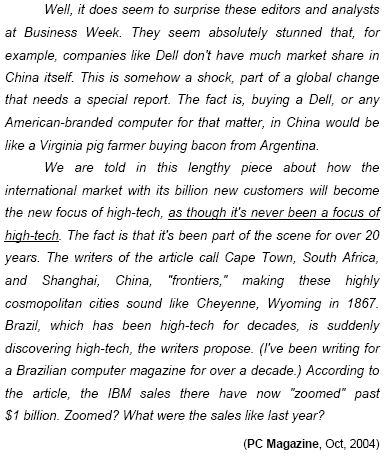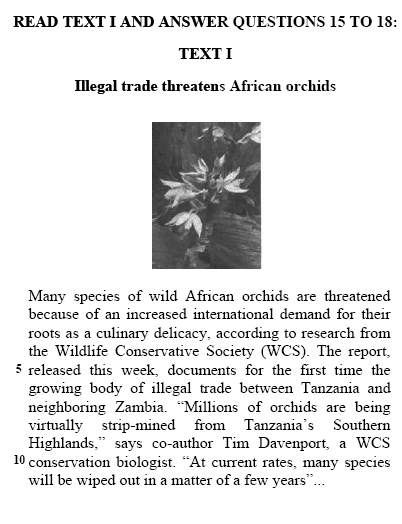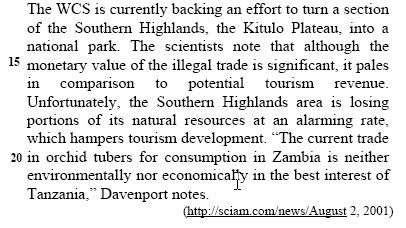Questões sobre Vocabulário
Lista completa de Questões sobre Vocabulário para resolução totalmente grátis. Selecione os assuntos no filtro de questões e comece a resolver exercícios.
Para responder às questões de números 58 a 60, considere o texto abaixo.


O sentido dado por unbelievable no texto também pode ser expresso por
- A.
amazing.
- B.
realistic.
- C.
wonderful.
- D.
awful.
- E.
average.

In the above text, but means
- A.
while.
- B.
therefore.
- C.
however.
- D.
although.
- E.
just.
No texto, So far they all have failed to live up to their promise significa:
- A.
Todas apresentaram um desempenho acima do anunciado.
- B.
Todas elas superaram as expectativas.
- C.
Nem de longe elas conseguiram cumprir todas as suas promessas.
- D.
Até agora, nenhuma cumpriu a promessa.
- E.
Todas elas tiveram uma longa vida útil, conforme previsto.
Read the text below in order to answer questions 21 to 23:
A QUICK GLANCE AT BRAZIL'S ECONOMY
In January 1999, the real, Brazil's monetary unit, was devalued by approximately 50% against the U.S. dollar, causing many to speculate on the country's economic fate as it moved toward the year 2000. Confidence in the economy waned and predictions of high inflation and deep recession ensued.
However, several factors helped turn things around throughout 1999. Brazil entered into a funding agreement with the International Monetary Fund (IMF) for $41 billion; President Fernando Henrique Cardoso's administration implemented strong fiscal contraction measures, which generated higher-than-expected revenue collection; and the tradable goods sector expanded.
By the end of 1999 there were clear indications of a re-stabilisation of the Brazilian economy and an increase in the overall level of confidence in Brazilian recovery. Consumer inflation levelled off at approximately 9%, the exchange rate for the real stabilized at R1.789/$1, and the primary fiscal balance rose from 0% in 1998 to a 3.1% gross domestic product (GDP) surplus (thus meeting one of the targets of the IMF programme).
When the Brazilian currency was devalued in 1999, confidence in the country's economy
- A. increased
- B. lessened
- C. vanished
- D. raised
- E. grew
Read the text below in order to answer questions 24 to 26:
DELIVERING STABILITY
The UK has a history of poor economic performance in comparison with other G7 economies. Much of the blame for this poor performance can be attributed to policy errors made in the past. The Government's macroeconomic framework has been designed to avoid a repeat of mistakes which led to boom and bust cycles and relative underperformance. In the face of the uncertainty and unpredictability of ever more rapid financial flows, the Government believes it is vital to:
. set clear, long-term policy objectives;
. adopt predictable, clear rules for monetary and fiscal policymaking; and
. keep markets properly informed, and insure that objectives and the relevant institutions which implement them are seen to be credible, through increased openness, accountability and transparency.
The text refers to 'boom and bust cycles' which are
- A. periods of sustainable structural growth
- B. cycles of relative certainty and predictability
- C. periods of fast development and of recession
- D. series of well-understood rules and regulations
- E. phases of increased openness and transparency
READ TEXT II AND ANSWER QUESTIONS 17 TO 24:
- A. alley;
- B. edge;
- C. exit;
- D. admittance;
- E. arrival.
Read the text below in order to answer questions 27 to 30:
FINANCIAL ENGINEERS
Financial engineers don't wear white lab coats. They don't experiment on rats or perform gas chromatography. Their raw material – money – isn't as jazzy as what biologists and physicists investigate. But the innovations they produce will contribute just as much to economic growth.
Maybe more, in fact. Because without the science of finance, all other sciences are just a bunch of neat concepts. Ideas begin to contribute to human betterment when they're financed – by venture capital, stock offerings, loans, or buyouts. A smoothly operating system showers money on good ideas. Equally important, it cuts off funding to tired ideas and tired companies, so their assets can be deployed more efficiently elsewhere. ( The lack of such a process in Japan helps explain why that nation remains part of the old economy.)
When a financial system cuts off funding, it- A. increases it
- B. implements it
- C. stops providing it
- D. negotiates it
- E. investigates it
READ TEXT II AND ANSWER QUESTIONS 17 TO 24:
- A. entrance;
- B. valley;
- C. temple;
- D. pyramid;
- E. tomb.
Read the text below in order to answer questions 27 to 30:
FINANCIAL ENGINEERS
Financial engineers don't wear white lab coats. They don't experiment on rats or perform gas chromatography. Their raw material – money – isn't as jazzy as what biologists and physicists investigate. But the innovations they produce will contribute just as much to economic growth.
Maybe more, in fact. Because without the science of finance, all other sciences are just a bunch of neat concepts. Ideas begin to contribute to human betterment when they're financed – by venture capital, stock offerings, loans, or buyouts. A smoothly operating system showers money on good ideas. Equally important, it cuts off funding to tired ideas and tired companies, so their assets can be deployed more efficiently elsewhere. ( The lack of such a process in Japan helps explain why that nation remains part of the old economy.)
The process of allocating funding only to the most productive sectors
- A. is missing in the Japanese economy
- B. has been carried out in Japan
- C. is a reality in the Japanese economy
- D. places Japan among the top economies
- E. was devised by Japanese companies


The biologist's statement functions as a:
- A.
praise;
- B.
support;
- C.
comparison
- D.
warning
- E.
disclaimer.


